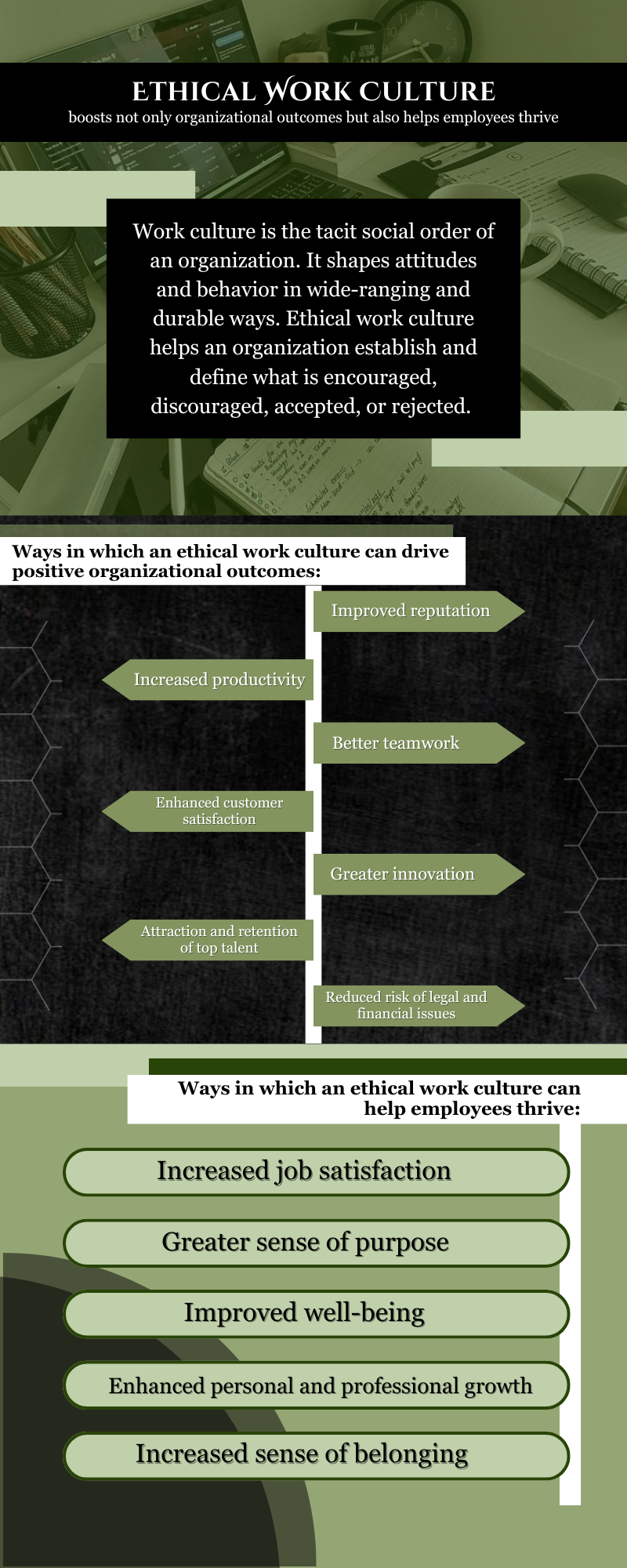Roadmap for Answer Writing Introduction Definition of Work Culture: Briefly explain what work culture means in the context of the police. Thesis Statement: State that the work culture of the police in India is characterized by indecision, inefficiency, and lack of empathy, which ...
Model Answer Introduction An ethical work culture is the underlying social order that shapes the behaviors and attitudes within an organization. It plays a crucial role in defining what is accepted or rejected, ultimately influencing both organizational success and employee development. Positive OrgRead more
Model Answer
Introduction
An ethical work culture is the underlying social order that shapes the behaviors and attitudes within an organization. It plays a crucial role in defining what is accepted or rejected, ultimately influencing both organizational success and employee development.
Positive Organizational Outcomes
1. Improved Reputation
An ethical work culture enhances the organization’s reputation, making it more attractive to customers and potential employees. A strong ethical stance signals integrity and reliability.
2. Increased Productivity
Employees in ethical environments are often more motivated and engaged. This heightened engagement leads to improved job performance, which in turn boosts overall productivity.
3. Better Teamwork
Ethical cultures promote honesty and trust, which fosters collaboration among employees. This cooperative spirit enhances teamwork and leads to better project outcomes.
4. Enhanced Customer Satisfaction
When employees feel valued and supported, they are more likely to deliver high-quality customer service, which significantly increases customer satisfaction.
5. Greater Innovation
An ethical environment encourages employees to voice their ideas, leading to greater innovation and creative solutions within the organization.
6. Attraction and Retention of Talent
Organizations that prioritize ethics attract and retain top talent, as employees prefer to work for companies that align with their values.
7. Reduced Legal Risks
An ethical culture minimizes the risk of legal and financial issues, as employees are more inclined to follow regulations and act in the organization’s best interests.
Supporting Employee Growth
1. Increased Job Satisfaction
Employees in fair, ethical environments report higher job satisfaction, feeling secure and valued in their roles.
2. Greater Sense of Purpose
An ethical culture helps employees find meaning in their work, knowing their contributions make a positive impact.
3. Improved Well-Being
Workplaces that prioritize ethics promote a healthier work-life balance, reducing stress among employees.
4. Enhanced Growth Opportunities
By encouraging idea-sharing, ethical cultures create opportunities for personal and professional development.
5. Increased Sense of Belonging
Valuing diversity and inclusion fosters a sense of belonging, making employees feel respected and valued.
Conclusion
An ethical work culture not only drives organizational success but also nurtures employee growth and satisfaction. By fostering an environment of integrity, organizations can achieve sustainable success while supporting their employees’ personal and professional development.
See less

Model Answer Introduction The work culture of the police in India is often characterized by indecision, inefficiency, and a lack of empathy. These issues not only hinder law enforcement but also affect the overall safety and security of the public. Challenges in Police Work Culture 1. Indecision andRead more
Model Answer
Introduction
The work culture of the police in India is often characterized by indecision, inefficiency, and a lack of empathy. These issues not only hinder law enforcement but also affect the overall safety and security of the public.
Challenges in Police Work Culture
1. Indecision and Risk Aversion
Police officials frequently exhibit indecision due to the fear of legal and extra-legal repercussions. This reluctance stems from organizational design flaws, political interference, and concerns over their careers. Such risk aversion undermines effective policing.
2. Inefficiency
The police force is typically overburdened, leading to long shifts and poor work-life balance. Inadequate training and lack of technical tools further exacerbate the inefficiency in handling modern crimes. Additionally, promotions are often tenure-based and politically motivated, reducing motivation to perform well.
3. Lack of Empathy
Compassion fatigue is prevalent among police personnel, who deal with vulnerable communities and traumatic situations. Insensitive handling of cases, particularly those involving women and marginalized groups, highlights the need for better training in human rights and sensitivity.
Remedial Measures
1. Strengthening Institutional Reforms
To prevent unwarranted government influence, the dominance of government officials in the State Security Commission should be minimized. This would promote impartiality.
2. Merit-Based Promotions
Promotions and postings should be based on merit and transparency, encouraging a culture of hard work and accountability.
3. Empowering Police Complaints Authority
The Police Complaints Authority (PCA) should be empowered to investigate serious misconduct, ensuring accountability among officers.
4. Specialization in Functions
Separating investigative roles from law and order duties would enhance specialization and improve performance.
5. Creating a SMART Police Force
Adopting the SMART framework—strict and sensitive, modern and mobile, alert and accountable, reliable and responsive—will foster a more effective and empathetic police force.
Conclusion
Addressing the challenges in the work culture of the police is essential for effective law enforcement in India. By implementing these remedial measures, we can create a more efficient, sensitive, and accountable police force that better serves the community.
See less